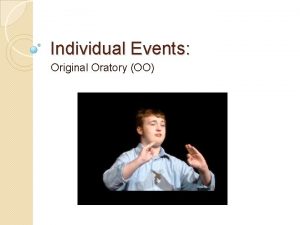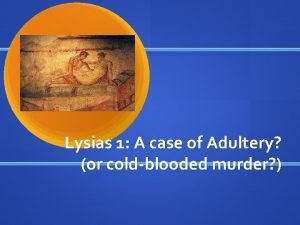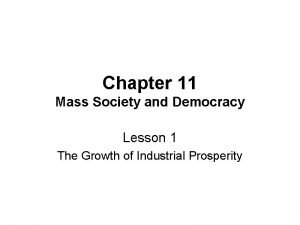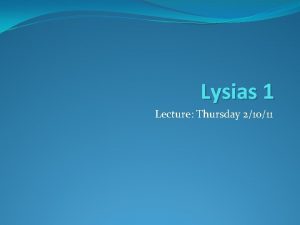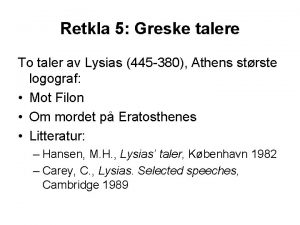Oratory and democracy Christine Plastow Lysias 2 17










- Slides: 10

Oratory and democracy Christine Plastow

Lysias 2. 17 -19 Now in many ways it was natural to our ancestors, moved by a single resolve, to fight the battles of justice: for the very beginning of their life was just. They had not been collected, like most nations, from every quarter, and had not settled in a foreign land after driving out its people: they were born of the soil, and possessed in one and the same country their mother and their fatherland. [18] They were the first and the only people in that time to drive out the ruling classes of their state and to establish a democracy, believing the liberty of all to be the strongest bond of agreement; by sharing with each other the hopes born of their perils they had freedom of soul in, their civic life, [19] and used law for honoring the good and punishing the evil. For they deemed that it was the way of wild beasts to be held subject to one another by force, but the duty of men to delimit justice by law, to convince by reason, and to serve these two in act by submitting to the sovereignty of law and the instruction of reason.

Isocrates Panegyricus (4) 21 -25 For in the first place, if it is the most experienced and the most capable who in any field of action deserve to be honored, it is without question our right to recover the hegemony which we formerly possessed; for no one can point to another state which so far excels in warfare on land as our city is superior in fighting battles on the sea. [22] But, in the next place, if there any who do not regard this as a fair basis of judgement, since the reversals of fortune are frequent (for sovereignty never remains in the same hands), and who believe that the hegemony, like any other prize, should be held by those who first won this honor, or else by those who have rendered the most service to the Hellenes, I think that these also are on our side; [23] for the farther back into the past we go in our examination of both these titles to leadership, the farther behind shall we leave those who dispute our claims. For it is admitted that our city is the oldest and the greatest in the world and in the eyes of all men the most renowned. But noble as is the foundation of our claims, the following grounds give us even a clearer title to distinction: [24] for we did not become dwellers in this land by driving others out of it, nor by finding it uninhabited, nor by coming together here a motley horde composed of many races; but we are of a lineage so noble and so pure that throughout our history we have continued in possession of the very land which gave us birth, since we are sprung from its very soil and are able to address our city by the very names which we apply to our nearest kin; [25] for we alone of all the Hellenes have the right to call our city at once nurse and fatherland mother. And yet, if men are to have good ground for pride and make just claims to leadership and frequently recall their ancestral glories, they must show that their race boasts an origin as noble as that which I have described

Demosthenes First Olynthiac (1. 1 -2) You would, I expect, men of Athens, accept it as the equivalent of a large amount of money, if it could be made clear to you what will prove our best policy in the matters now under discussion. This then being so, you are bound to give an eager hearing to all who offer advice. For not only if someone comes forward with a well-considered plan, could you hear and accept it, but also I count it part of your good fortune that more than one speaker may be inspired with suitable suggestions on the spur of the moment, so that out of the multitude of proposals the choice of the best should not be difficult. [2] The present crisis, Athenians, calls on you, almost with an audible voice, to take into your own hands the control of your interests in the North, if you are really anxious to safeguard them. But, I confess, our attitude puzzles me. My own idea would be to vote an expedition at once, to make instant preparation for its dispatch, thus avoiding our previous blunder, and to send ambassadors to state our intentions and watch events. Demosthenes Second Olynthiac (2. 1 -3) On many occasions, men of Athens, one may, I think, recognize the manifest favor of heaven towards our city, and not least at the present crisis. That Philip has found men willing to fight him, situated on his frontiers and possessed of considerable power, above all so determined that they regard any accommodation with him as both delusive and fatal to their own country—this has all the appearance of a super-human, a divine beneficence. [2] So the time has come, men of Athens, to look to it that we do not prove more unfriendly to ourselves than circumstances have been, for we shall show ourselves the meanest of mankind, if we abandon not only the cities and the places which we once called our own, but the very allies that fortune has raised up for us and the chances she throws in our way. [3] Now I do not choose, Athenians, to enumerate the resources of Philip and by such arguments to call on you to rise to the occasion. Do you ask why? Because it seems to me that any dissertation on that topic is a tribute to his enterprise, but a record of our failure. For the higher he has raised himself above his proper level, the more he wins the admiration of the world; but the more you have failed to improve your opportunities, the greater is the discredit that you have incurred.

Antiphon 6. 35 -6 I was about to prosecute Aristion, Philinus, Ampelinus, and the secretary to the Thesmothetae, with whose embezzlements they had been associated, on charges which I had presented to the Council in the form of an impeachment. As far as the facts of the case were concerned, they had no hope of acquittal: their offences were too serious. On the other hand, could they but induce my accusers here to register a charge and proclaim that I was under the statutory ban, they would, they thought, be safely rid of the whole business. [36] The law runs that the ban comes into force as soon as anyone has a charge of murder registered against him; and if placed under it, not only should I myself have been unable to proeeed with my case, but once the party responsible for the impeachment and in possession of the facts failed to proceed, the four would gain an acquittal without difficulty, and the wrong which they had done you would go unpunished. I was not, I may say, the first against whom Philinus and his companions had employed this device; they had already done the same to Lysistratus, as you have heard for yourselves

Demosthenes 22. 25 -7 ‘Now this is what you must grasp, that Solon who made these laws and most of the rest, was a different kind of legislator from Androtion. He granted not just one means of get justice from wrongdoers to those who wanted it but several. I think he knew that it was impossible for everyone in the city to be equally clever or confident or reasonable. So if he were to make the laws in a way which would suffice for reasonable men to get justice, he thought that many would behave criminally with impunity. If he were to make them in a way that suited the confident and the able speakers, ordinary men would be unable to get justice in the same way as these. [26] He thought that no-one should be deprived of the chance to get justice in a way that fits his abilities. How can this be done? If he grants many routes through the laws to advance against wrongdoers. For instance in the case of theft. You’re fit and confident; arrest him (apage). Your risk is a thousand drachmas. You’re rather weak; direct (ephegou) the magistrates to him; they’ll arrest him. [27] You’re afraid of this too; bring an indictment (graphou). You have a low opinion of yourself and as a poor man you couldn’t pay a thousand drachmas; bring a private suit (dikazou) for theft before the arbitrator and you’ll run no risk. None of these is the same. In the case of impiety too the same options apply, arrest (apagein), indictment (graphesthai), private suit (dikazesthai) before the Eumolpidai, denunciation (phainein) before the King-Archon. And the same applies to virtually everything else. ’

Demosthenes 23. 63 -4 Besides the laws cited, he has violated many other statutes, which we have not put on the schedule because they are so numerous. I offer a summary statement. Take the laws which deal with courts of homicide, and which order the contending parties to summon one another, or to tender evidence, or to take their oaths, or which give them any other direction; he has violated every one of them; he has drafted this decree in contravention of them all. What other account can one give, when there is no summons, no evidence by witnesses of the fact, no oath-taking, —when the penalty follows on the heels of the accusation, and that a penalty forbidden by the laws? Yet all the proceedings I have named are in use, as ordered by statute, at five different tribunals. [64] —Yes, but, —someone will say, —those tribunals are worthless and unfairly constituted, whereas the proposals of the defendant are righteous and admirable. —I deny it. I say that of all the proposals ever laid before you I know of none more outrageous than this decree, and that of all the tribunals to be found in the whole world there are none that can be shown to be more venerable or more righteous than ours. I desire to speak briefly of certain truths, the relation of which reflects credit and honor upon the city, and which you will be gratified to hear. I will begin with a statement which you will find especially instructive, first referring to the free gift which has already been conferred upon Charidemus.

Antiphon 5. 76 -8 Before the revolt of Mytilene my father gave visible proof of his devotion to your interests. When, however, the city as a whole was so ill-advised as to commit the blunder of revolting, he was forced to join the city as a whole in that blunder. Not but what even then his feelings towards you remained unchanged: although he could no longer display his devotion in the old way. It was not easy for him to leave the city, as the ties which bound him, his children, and his property, were strong ones; nor yet could he set it at defiance as long as he remained there. [77] But from the moment that you punished the authors of the revolt—of whom my father was not found to be one—and granted the other citizens of Mytilene an amnesty which allowed them to continue living on their own land, he has not been guilty of a single fault, of a single lapse from duty. He has failed neither the city of Athens nor that of Mytilene, when a public service was demanded of him; he regularly furnishes choruses, and always pays the imposts. [78] If Aenus is his favorite place of resort, that fact does not mean that he is evading any of his obligations towards Athens, or that he has become the citizen of another city, like those others, some of whom I see crossing to the mainland settling among your enemies, while the rest actually litigate with you under treaty; nor does it mean that he desires to be beyond the reach of the Athenian courts. It means that he shares your own hatred of those who thrive on prosecution.

Lysias 12. 16 -19 With these conclusions I took to flight, while they were keeping guard over the courtyard door: there were three doors for me to pass through, and they all chanced to be open. I reached the house of Archeneos the ship-captain, and sent him into town to inquire after my brother: on his return he told me that Eratosthenes had arrested him in the street and taken him off to prison. [17] Thus apprised of his fate, I sailed across on the following night to Megara. Polemarchus received from the Thirty their accustomed order to drink hemlock, with no statement made as to the reason for his execution: still less was he allowed to be tried and defend himself. [18] And when he was being brought away dead from the prison, although we had three houses amongst us, they did not permit his funeral to be conducted from any of them, but they hired a small hut in which to lay him out. We had plenty of cloaks, yet they refused our request of one for the funeral; but our friends gave either a cloak, or a pillow, or whatever each had to spare, for his interment. [19] They had seven hundred shields of ours, they had all that silver and gold, with copper, jewellery, furniture and women's apparel beyond what they had ever expected to get; also a hundred and twenty slaves, of whom they took the ablest, delivering the rest to the Treasury; and yet to what extremes of insatiable greed for gain did they go, in this revelation that they made of their personal character! For some twisted gold earrings, which Polemarchus's wife had in her possession when she first came into his house, were taken out of her ears by Melobius.

Lysias 13. 44 -8 It gives me pain, indeed, to recall the calamities that have befallen the city, but it is a necessity, gentlemen of the jury, at the present moment, so that you may know how richly Agoratus deserves your pity! For you know the character and number of the citizens who were brought away from Salamis, and the way in which they were destroyed by the Thirty. You know what a great number of the people of Eleusis shared that calamity. [45] You remember also our people here who were haled to prison on account of private enmities; and who, having done no harm to the city, were compelled to perish by the most shameful, the most infamous, of deaths. Some left elderly parents behind them, who were expecting to be supported in their old age by their own children and, when they should end their days, to be laid by them in the grave; others left sisters unwedded, and others little children who still required much tendance. [46] What sort of feelings, gentlemen, do you think are theirs towards this man, or what kind of vote would they give, if it rested with them, when by his act they have been deprived of their best comforts? You recollect, again, how the walls were demolished, the ships surrendered to the enemy, the arsenals destroyed, our Acropolis occupied by the Lacedaemonians, and the whole strength of the city crippled, so that our city was sunk to a level with the smallest in the world! [47] And besides all this, you lost your private possessions and finally, at one swoop, you were all expelled by the Thirty from your native land. Impressed with these perils, those loyal citizens, gentlemen, refused their assent to the conditions of peace, [48] and you, Agoratus, because they sought to do the State some service, brought about their death by laying information that they were intriguing against our democracy; and you are responsible for all the troubles that have befallen the city. So now let each of you remember the misfortunes caused both to individuals and to the common weal of the city, and take vengeance on their author



